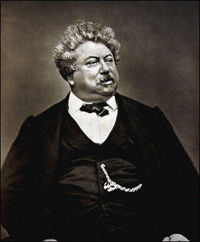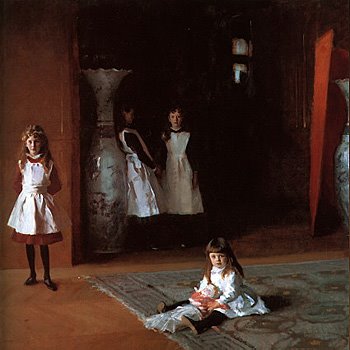stertorous - adj - characterized by heavy snoring
After a long week of work, I nearly feel as if I'd been running a marathon, so my sleep must be characterized by this type of breathing. We had the unfortunate event of letting go of one of the contractors, so I have had to pick up his work. Hence my absence on this list recently. I hope to return in full force next week.
Friday, October 27, 2006
syncretism

syncretism – n - The attempted reconciliation or union of different or opposing principles, practices, or parties, as in philosophy or religion.
I suppose a religious example might be the Anglican religion, which was at one time the 'via media' ('middle way' as C S Lewis described it) between Catholicism and most Protestant churches. In philosophy, Immanuel Kant's Critique of Pure Reason attempted to reconcile rationalism and empiricism.
Today's tangent is directed at Jeff, although it interested me as much as I hope it will interest Natalie too. The London Times has a review by Antonia Fraser of a new translation of Alexander Dumas's classic, The Three Musketeers; she's inspired me to give the novel a long overdue re-reading. Here's a sample:
"Why is Dumas’ tale imperishable? First The Three Musketeers has strong elements of a fairytale: one founded on a quest. D’Artagnan is the provincial youth who sets out on a despicable yellow nag, armed with nothing but a letter of introduction to M de Tréville, head of the King’s Musketeers – a letter that is almost immediately stolen. He is handsome, naive and aggressive. It goes without saying that the three musketeers, Athos, Aramis and Porthos, are expert swordsmen, and extremely quick on the draw. D’Artagnan, no slouch himself — “you walking sword blade” is a not inappropriate comment — has scarcely encountered them when he has challenged all three to a series of duels. He finally wins through to his heart’s desire and becomes a musketeer.
"Secondly, the plotting is good and the pace terrific. Although we know from the history books that the Duke of Buckingham will be assassinated by a man named John Felton, we still thrill to the tale of Felton’s seduction by the wicked Milady and hope that she will somehow be frustrated."
Check out the whole thing at http://www.timesonline.co.uk/article/0,,923-2400897,00.html.
Wednesday, October 25, 2006
equivocate

equivocate – v - To use ambiguous or unclear expressions, usually to avoid commitment or in order to mislead; prevaricate or hedge.
This is the essence of modern political speech. A prime example would be John Kerry's answer to a question on abortion during the 2004 sound-bite-exchange. He claimed that as a Roman Catholic he disapproved, but he didn't feel he could impose his personal morality on others. Even forgetting the fact that many if not most laws impose morality on others, his answer was laughable. Here's a man who claims to be a Catholic, but who divorced his first wife, lived with his current wife before marrying her, and, when he did finally get around to that technicality, married her in a civil ceremony. Need I mention that every one of those acts violated Catholic teachings? In the eyes of the church he's not married; he also has at least three sins to confess if he ever finds it convenient to indulge in the sacrament of Penance. More than incidentally, if he receives Communion without Penance, he can add another mortal sin to the list. At least he was capable of putting together a coherent English sentence.
Monday, October 23, 2006
orgiastic
orgiastic - adj - of, pertaining to, or having the nature of an orgy; tending to arouse or excite unrestrained emotion; reaching a peak of emotional intensity, often of an ecstatic nature and frequently expressed by uninhibited behavior
I'll just let your imagination roam on this one...
I'll just let your imagination roam on this one...
serging
serging - the process of overcasting the raw edges of a piece of fabric (as a carpet) to prevent raveling
Serging and overcasting are similar, so here's what wikipedia says about serging that also throws in a little about overcasting:
Serging: trimming the edge of fabric and overcasting all in one step, sometimes with the option of stitching as well. Also used for creating artistic effects. Serging is ideal for stretchy fabrics or fabrics that should have neat edges. Virtually all commercially-sold clothing is completely made with one or more specialized industrial sergers.
Here's where some serging has come undone:

Serging and overcasting are similar, so here's what wikipedia says about serging that also throws in a little about overcasting:
Serging: trimming the edge of fabric and overcasting all in one step, sometimes with the option of stitching as well. Also used for creating artistic effects. Serging is ideal for stretchy fabrics or fabrics that should have neat edges. Virtually all commercially-sold clothing is completely made with one or more specialized industrial sergers.
Here's where some serging has come undone:

Friday, October 20, 2006
ex officio

ex officio - adv, adj - By virtue of office or position.
I have nothing in particular to say about this term, so I'll give an example and move on: The president of the United States is ex officio commander in chief of the military.
Now on to Dante Alighieri (1265-1321). The most widely read part of his Comedy is Inferno (you should read the whole thing), and the best known part of Inferno is the inscription above the gates of Hell:
Through me you pass into the city of woe:
Through me you pass into eternal pain:
Through me among the people lost for aye.
Justice the founder of my fabric mov'd:
To rear me was the task of power divine,
Supremest wisdom, and primeval love.
Before me things create were none,
save thingsEternal, and eternal I endure.
All hope abandon ye who enter here.
Dante's Hell has nine circles, each more terrifying than the last. The ninth circle is reserved for traitors. There we find Satan gnawing eternally on Judas, Brutus, and Cassius.
I've read the Comedy twice, and I'm not done with it yet. I've also read the Inferno with my son Michael as part of his education. There are many good English translations; I use the one by Mark Musa in the Portable Dante. Check out the notes and commentary provided before you select a version to read; the poem contains names and references that would have been common knowledge to Dante's contemporaries, but which a modern reader (myself included) probably won't get.
Dante's Comedy gives a powerful picture of the world as seen by an educated man of the High Middle Ages. I can't recommend it too strongly. (Note: The poem is usually published as The Divine Comedy, but Dante's title was simply La Commedia. How's that for pedantic?)
Thursday, October 19, 2006
qua
qua - adv - as; as being; in the character or capacity of
This word seems to need commas surrounding it. For example: 'The President, qua commander in chief, may call on the Marines in time of need'.
This word seems to need commas surrounding it. For example: 'The President, qua commander in chief, may call on the Marines in time of need'.
consanguinity

consanguinity –noun - Relationship by descent from a common ancestor; kinship; close relationship or connection.
Another five-syllable word!
I think the rule has been relaxed, but the Catholic church long forbade marriage in cases where the two parties had a common ancestor within seven generations.
And now, for (I hope) your amusement, here's an excerpt in middle-English of publisher William Caxton's preface to Sir Thomas Malory's (1405-1471) Le Morte D'Arthur. My daughter flew into a rage after reading this; "He'd get an F in my school!" etc.
AFter that I had accomplysshed and fynysshed dyuers hystoryes as wel of contemplacyon as of other hystoryal and wordly actes of grete conquerours & prynces / And also certeyn bookes of ensaumples and doctryne / Many noble and dyuers gentylmen of thys royame of Englond camen and demaunded me many and oftymes / wherfore that I haue not do made & enprynte the noble hystorye of the saynt greal / and of the moost renomed crysten kyng / Fyrst and chyef of the thre best crysten and worthy / kyng Arthur / whyche ought moost to be remembred emonge vs englysshe men tofore al other crysten kynges / For it is notoyrly knowen thorugh the vnyuersal world / that there been ix worthy & the best that euer were / That is to wete thre paynyms / thre Iewes and thre crysten men / As for the paynyms they were tofore the Incarnacyon of Cryst / whiche were named / the fyrst Hector of Troye / of whome thystorye is comen bothe in balade and in prose / The second Alysaunder the grete / & the thyrd Iulyus Cezar Emperour of Rome of whome thystoryes ben wel kno and had / And as for the thre Iewes whyche also were tofore thyncarnacyon of our lord of whome the fyrst was Duc Iosue whyche brought the chyldren of Israhel in to the londe of byheste / The second Dauyd kyng of Iherusalem / & the thyrd Iudas Machabeus of these thre the byble reherceth al theyr noble hystoryes & actes / And sythe the sayd Incarnacyon haue ben thre noble crysten men stalled and admytted thorugh the vnyuersal world in to the nombre of the ix beste & worthy / of whome was fyrst the noble Arthur / whos noble actes I purpose to wryte in thys present book here folowyng / The second was Charlemayn or Charles the grete / of whome thystorye is had in many places bothe in frensshe and englysshe / and the thyrd and last was Godefray of boloyn / of whos actes & lyf I made a book vnto thexcellent prynce and kyng of noble memorye kyng Edward the fourth / the sayd noble Ientylmen Instantly requyred me temprynte thystorye of the sayd noble kyng and conquerour kyng Arthur / and of his knyghtes wyth thystorye of the saynt greal / and of the deth and endyng of the sayd Arthur / Affermyng that I out rather tenprynte his actes and noble feates / than of godefroye of boloyne / or ony the other eyght / consyderyng that he was a man borne wythin this royame and kyng and Emperour of the same / And that there ben in frensshe dyuers and many noble volumes of his actes / and also of his knyghtes / To whome I answerd / that dyuers men holde oppynyon / that there was no suche Arthur / and that alle suche bookes as been maad of hym / ben fayned and fables / by cause that somme cronycles make of hym no mencyon ne remembre hym noo thynge ne of his knyghtes / wherto they answerd / and one if specyal sayd / that in hym that shold say or thynke / that there was neuer suche a kynge callyd Arthur / myght wel be aretted grete folye and blyndenesse / For he sayd that there were many euydences of the contrarye / Fyrst ye may see his sepulture in the monasterye of Glastyngburye / And also in polycronycon in the v book the syxte chappytre / and in the seuenth book the xxiij chappytre/ where his body was buryed and after founden and translated in to the sayd monasterye / ye shal se also in thystorye of bochas in his book de casu principum / parte of his noble actes / and also of his falle / Also galfrydus in his brutysshe book recounteth his lyf / and in dyuers places of Englond / many remembraunces ben yet of hym and shall remayne perpetuelly / and also of his knyghtes.
Wednesday, October 18, 2006
scurrilous
scurrilous - adj - grossly or obscenely abusive; characterized by or using buffoonery; coarsely jocular or derisive.
I think of this word while reading parts of the 'Lord of the Flies', of which, unfortunately, I have no excerpt as an example. Perhaps Jack has one handy...
I think of this word while reading parts of the 'Lord of the Flies', of which, unfortunately, I have no excerpt as an example. Perhaps Jack has one handy...
ex cathedra
ex cathedra - adj, adv - from the seat of authority; with authority: used esp. of those pronouncements of the pope that are considered infallible.
English is an eclectic language. First there were the Britons, then the Angles and Saxons came, then the Danes, then the Normans, and then - I can't go on; if you're interested, check out Melanie Phillips's book Londonistan. What is being done to Europe - or should I say Eurabia? - is one of the greatest civilizational (neologism?) crimes in history. At least the Romans put up a fight. (By the way, if what I've just said is racist or xenophobic, make the most of it. One thing I'll say for Cultural Marxism is that it's a great vocabulary builder.)
English is an eclectic language. First there were the Britons, then the Angles and Saxons came, then the Danes, then the Normans, and then - I can't go on; if you're interested, check out Melanie Phillips's book Londonistan. What is being done to Europe - or should I say Eurabia? - is one of the greatest civilizational (neologism?) crimes in history. At least the Romans put up a fight. (By the way, if what I've just said is racist or xenophobic, make the most of it. One thing I'll say for Cultural Marxism is that it's a great vocabulary builder.)
Tuesday, October 17, 2006
disingenuous
disingenuous – adj - Lacking in frankness, candor, or sincerity; falsely or hypocritically ingenuous; insincere.
This is one of our more frequently used five-syllable words.
Tangent: My life took a turn for the better once I finally learned to say two things:
1) "I don't know."
2) "I was wrong."
Now if only my older son would learn to say them there would be a massive change in the quality of both our lives. (Come to think of it, he often strikes me as disingenuous; maybe this isn't a tangent after all.)
This is one of our more frequently used five-syllable words.
Tangent: My life took a turn for the better once I finally learned to say two things:
1) "I don't know."
2) "I was wrong."
Now if only my older son would learn to say them there would be a massive change in the quality of both our lives. (Come to think of it, he often strikes me as disingenuous; maybe this isn't a tangent after all.)
Monday, October 16, 2006
indomitable
indomitable - adj - incapable of being subdued or overcome; unconquerable
Tagging along with Jack here, in a different way. Often, an austere person is seen as indomitable either due to their sternness, or strict discipline.
Tagging along with Jack here, in a different way. Often, an austere person is seen as indomitable either due to their sternness, or strict discipline.
austere

austere – adj - Severe in manner or appearance; uncompromising; strict; forbidding.
Tangent: Is it acceptable to lie when it's done on behalf of a worthy cause? On the other hand, why would a worthy cause need lies to support it?
Tangent: The painting is John Singer Sargent's portrait of the daughters of Edward Darly Boit (1882). Recent commentary on this painting by a tenured academic whose name I've forgotten provides some insight into what's wrong with modern humanities. The appreciation of beauty has been cast aside in favor of the search for sexism, racism, homophobia, classism, etc. In other words, works are judged on their conformity to standards set by cultural Marxism, better known as political correctness.
First, the claim is made that the girls are mere objects. The reasoning is that they have no names! Well, a minute's search on the internet established that they do have names; standing left-to-right are Mary Louise (age eight), Florence (14), and Jane (12); the one sitting is Julia (four).
Second, the girls are wearing uniforms! (I'm not making this up.) As a matter of fact, they're wearing standard Gilded Age girl clothes: pinafores and opaque stockings. If the men in the house had been included in the portrait, you might conclude that they were wearing uniforms too.
Third - and most important - look at little Julia. Notice that her legs are spread, and what's that between them? A baby! Get it? Huh? Huh? Huh?
God save us.
Friday, October 13, 2006
concinnity
concinnity - noun - internal harmony or fitness in the adaptation of parts to a whole or to each other; elegance, especially of the literary style.
See, I would have used this to describe one of the most beautiful forms found in creation, however it seems this word applies more to literature.
See, I would have used this to describe one of the most beautiful forms found in creation, however it seems this word applies more to literature.
de riguer

de rigueur - adj - Required by the current fashion or custom; socially obligatory.
This term was in very common use when I was growing up in New York. I now wonder how this bit of French got started in an area mostly populated by blue collar Irish and Italians. As Nelson Muntz said, "It's one of those things we'll never know, like what's the square root of a million."
Thursday, October 12, 2006
brutalize

brutalize - v - To make cruel, harsh, or unfeeling; to treat cruelly or harshly.
This is one of my uglier entries.
I am not an enthusiast for true crime stories, but three murder cases have long fascinated me, viz., the Jack the Ripper murders of 1888, the Lizzie Border case of 1892, and the Black Dahlia horror of 1947. What all three cases have in common is that there is doubt about the identity of the murderer. I am now satisfied that Lizzie Borden did indeed murder her father Andrew and her stepmpther Abby on that hot August day in Fall River, Massachusetts. I am also persuaded, after reviewing research by novelist Patricia Cornwell, that impressionist painter Walter Sickert was the Ripper. The one case that remains a mystery is the Black Dahlia murder. (Warning: This post may be unsettling from this point on; I have often wished I'd never hear of the Black Dahlia.)
On a January morning in 1947, a mother and her three-year-old daughter were walking past a field in Los Angeles when the mother saw what she thought was a broken mannequin. On closer inspection, the mannequin turned out to be the naked body of a young woman. The body had been cut in half at the waist and been horribly - what's the right word? - mutilated? defiled? Words fail me. The corpse was identified as that of a pretty Massachusetts girl named Elizabeth Short. Betty Short was in her mid-20s; she had come to Hollywood, like many other pretty girls, to get into movies. She did attain fame, but not the kind she sought. The autopsy revealed that she had been tortured to death over a period of 24 to 36 hours. Her body had then been sawed in half, washed clean of blood, and dumped in that field.
The police launched a massive manhunt, a virtually door-to-door search for the murderer, without success. The identity of the Black Dahlia killer is still a mystery.
The case has inspired at least two novels, John Gregory Dunne's True Confessions and James Ellroy's The Black Dahlia, both of which have been made into movies. I've seen True Confessions (with Robert Duvall and Robert De Niro), but I'm actually afraid of watching The Black Dahlia. If either of you have seen it, I'd love to hear your review.
Wednesday, October 11, 2006
disparage
disparage - verb - to speak of or treat slightingly; depreciate; belittle; to bring reproach or discredit upon; lower the estimation of
Subscribe to:
Posts (Atom)